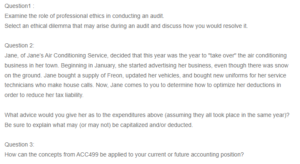Ethical Integrity and Financial Strategy in Accounting Practice
The Role of Professional Ethics in Conducting an Audit.
Audits rely on professional ethics to maintain good objectivity, integrity, and professional conduct. However, Audit processes are subject to ethical dilemmas arising from aspects such as confidentiality, conflicts of interest, and professional confidentiality (Haeridistia & Fadjarenie, 2019). One example of an ethical dilemma that can occur during an audit is the pressure to ignore or overlook fraudulent activities or material misstatements. Normally, this is the case when there is fear that disclosing such information could harm the company’s reputation. Resolving the ethical dilemma would entail following various steps. They include reflecting on professional standards and ethical principles, evaluating the significance of the misstatement, consulting with the audit team’s senior members, documenting the findings and concerns, assessing regulatory obligations, communicating with the management, and withdrawing from the engagement if necessary.
The Advice I Would Give to Jane as to the Expenditures
The promoting expenses for Jane, such as advertising, are ordinary business deductible expenses. On the other hand, the costs of acquiring Freon, buying new uniforms for service technicians, and updating vehicles qualify for capital expenditures. As a result, Jane should consider deducting the identified deductible expenses and capitalizing the capital expenditures. Capital expenditures are allowable fully in the first year of operation against taxes (McKenzie & Smart, 2019). Thus, Jane should consider the allowance to reduce her tax liability.
How the Concepts from ACC499 Can Be Applied to My Future Accounting Position
The concepts from ACC499 can help my future accounting profession because they will be applicable in the real business world. I will be able to account for leases effectively while considering ethics. Further, I will be able to handle the accounting of investments and accounting of long-term receivables. Based on these concepts, I will be able to offer professional advice to stakeholders who need accounting information. For instance, I will be able to advise businesses on how to reduce their tax liability by carefully considering their incomes and expenditures.
References
Haeridistia, N., & Fadjarenie, A. (2019). The Effect of Independence, professional Ethics & Auditor experience in audit quality. International Journal of Scientific & Technology Research, 8(2), 24-27.
McKenzie, K. J., & Smart, M. (2019). Tax Policy Next to the Elephant: Business Tax Reform in The Wake of the US Tax Cuts and Jobs Act. CD Howe Institute Commentary, 537.
ORDER A PLAGIARISM-FREE PAPER HERE
We’ll write everything from scratch
Question
Question1 :
Examine the role of professional ethics in conducting an audit.
Select an ethical dilemma that may arise during an audit and discuss how you would resolve it.

Ethical Integrity and Financial Strategy in Accounting Practice
Question 2:
Jane, of Jane’s Air Conditioning Service, decided that this year was the year to “take over” the air conditioning business in her town. Beginning in January, she started advertising her business, even though there was snow on the ground. Jane bought a supply of Freon, updated her vehicles, and bought new uniforms for her service technicians who make house calls. Now, Jane comes to you to determine how to optimize her deductions in order to reduce her tax liability.
What advice would you give her as to the expenditures above (assuming they all took place in the same year)? Be sure to explain what may (or may not) be capitalized and/or deducted.
Question 3:
How can the concepts from ACC499 be applied to your current or future accounting position?

